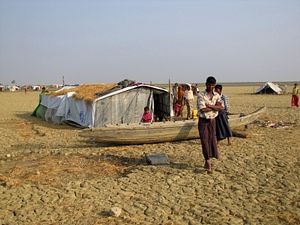This week, headlines were focused on a surprising decision by a Yangon court in favor of two jailed Reuters reporters in what has become a landmark case for press freedom in Myanmar. But while the decision itself might be encouraging, it nonetheless masks the real trouble with the case itself and what it says about the state of the country on this score.
It is worth recalling the big picture here: that the two Reuters correspondents were initially detained simply for documenting a massacre that the Myanmar government continues to deny or downplay under the leadership of former Nobel laureate and State Counselor Aung San Suu Kyi. Hearings to decide whether Reuters reporters Wa Lone, 32, and Kyaw Soe Oo, 28, will be charged under the colonial-era Official Secrets Act, which carries a maximum penalty of 14 years in prison, have been underway since January.
The pair had been working on an investigation into the killings of 10 Rohingya men and boys in Myanmar’s troubled Rakhine state during the military crackdown, which the government justified as a means of rooting out potential terrorists. Their investigations uncovered photos of the 10 kneeling with their hands tied before being executed, and a mass grave where they were buried.
The fact that they have met this fate for simply trying to uncover the truth is not surprising but nonetheless deeply troubling: Myanmar has maintained its policy of denying the Muslim Rohingya any form of recognition, despite having lived in the predominantly Buddhist country for generations (indeed, the word “Rohingya” is frowned upon, and the government, including Suu Kyi, prefer the word “Bengali”).
Indications so far suggest that, as expected, the case does not really have much in the way of a legal foundation. Last month, for instance, a police officer, a witness for the prosecution, testified the pair had been set up by Police Brigadier General Tin Ko Ko.
But the real troubling fact was that though that in and of itself should have warranted a dismissal of the case, Captain Moe Yan Naing has been pilloried by his seniors and his family evicted from their home, which was a government house. His family has been denied access to him after being told he is being held in a “safe place.”
The decision to proceed with prosecution followed an announcement that four army officers and three soldiers were sentenced to 10 years of hard labor for their roles in the Rohingya atrocities, and expelled from the military. Details of their actual involvement remain sketchy, and given the scale of allegations and the exodus of some 700,000 people into Bangladesh, legal action against the perpetrators to date seems paltry at best. Instead, the focus remains on the messenger.
Some 163 civil groups have signed an open letter to President Win Myint asking him to immediately release the two reporters accused of possessing secret government papers in what they called; “obviously an unreasonable case.”
“We believe that this is not a fair case … What we all want is truth and justice,” Thatoe Aung, a human rights activist who helped organize the petition to the president, said in a Reuters dispatch.
Western nations, press freedom advocates, and senior officials with the United Nations have also called for the release of the two Reuters reporters. The International Criminal Court is deciding if it has jurisdiction over the “deportation” of Rohingya to Bangladesh and whether this constitutes a crime against humanity. The U.S. government is also conducting its own investigations into alleged atrocities, including the allegations of murder, rape and torture; that could also be used to prosecute the Myanmar military.
All this is worth keeping in mind even when occasional advances might be celebrated. That includes the one this week, where a judge in the case made a surprising announcement that he would indeed accept the police captain’s evidence rather than throwing it out.
The decision was rightly noted as a surprising and rare display of the independence of the judiciary in Myanmar, and an advance in favor of the journalists. But that should not in any way detract from the broader, sobering reality that the trial’s occurrence itself is a troubling development for press freedom in Myanmar, and speaks volumes about the major challenges it faces in the treatment of the Rohingya population and how it treats journalists, foreign and local. As Human Rights Watch recently noted, there is little cause for celebration when it comes to press freedom in Myanmar amid the country’s backsliding.
Luke Hunt can be followed on Twitter @lukeanthonyhunt

































